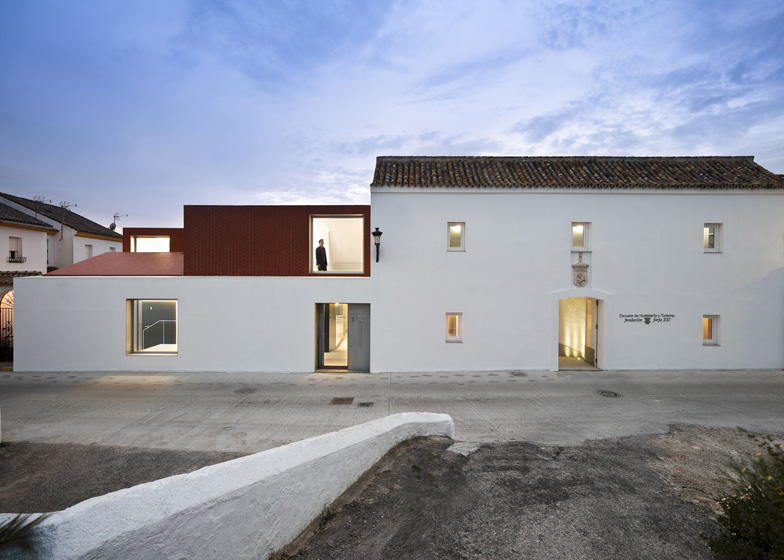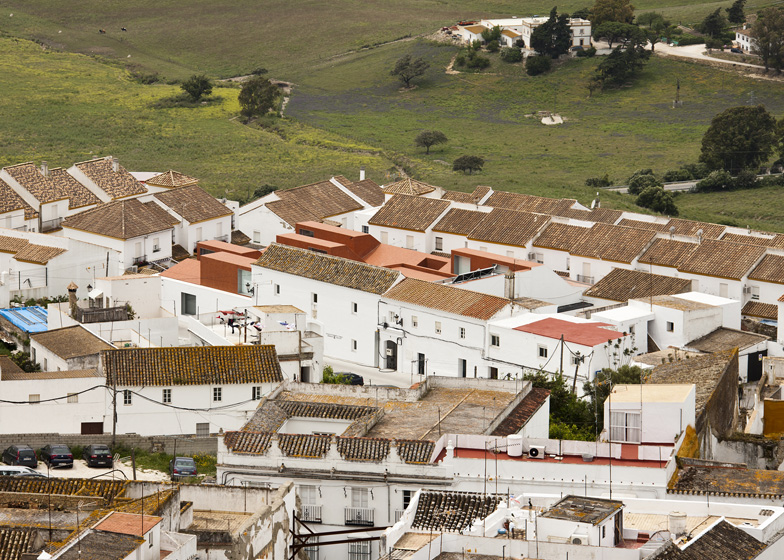Spanish architecture studio Sol89 has converted a former slaughterhouse in the historic town of Medina-Sidonia into a school for training chefs (+ slideshow).
Constructed in the nineteenth century, the building previously featured a series of outdoor paddocks and a large courtyard, used for storing livestock before the slaughtering process. As part of the renovation, Sol89 has extended the building into these spaces to create kitchens and classrooms.
Like most of the town's architecture, white-painted walls surrounded the perimeter of the slaughterhouse site and now enclose both the new and old sections of the building.
The original pitched roof is clad with traditional clay tiles, but the architects used modern flat ceramics to give a vibrant red to the asymmetric gables that make up the roof of the extension.
"If we observe Medina-Sidonia from a distance, it seems to be a unique ceramic creation moulded by the topography of Medina," explain architects María González and Juanjo López de la Cruz. "The Professional Cooking School uses this idea of the moulded ceramic plane to draw its geometry. This roof lends unity to the built complex and interprets the traditional construction of the place."
The original arched doorway remains as the entrance to the school and leads in via the old structure. Inside, the architects have replaced the original flooring with exposed concrete that skirts around a set of historic columns in the main hall.
The kitchens are lined with tiles on the floors and walls. High level windows help to bring light in from above, while small glass courtyards are positioned at intervals to provide areas for students to grow vegetables and herbs.
A few slaughterhouses in Spain have been converted to new uses in recent years. Others we've featured include an office and event space in Madrid and a cinema in the same city.
See more architecture projects in Spain, including the restoration of a coastal landscape in Cadaqués.
Photography is by Fernando Alda - see more pictures of this project on his website.
Here's some more information from Sol89
Medina is a historic town in the hills in Cadiz. Its houses are known for their whitewashed walls and their ceramic roofs. The project involves adapting an ancient slaughterhouse, built in the XIX century, into a Professional Cooking School.
The ancient slaughterhouse was composed of a small construction around a courtyard and a high white wall that limits the plot. If you are going to act in the historic city you must adapting, taking shelter, settling in its empty spaces. The density of the architecture of the ancient slaughterhouse, where brick walls, stones and Phoenician columns coexist, contrasts with the empty space inside the plot, limited by the wall. The project proposes catching this space through a new ceramic roof that limits the new construction and consolidates the original building.
If we observe Medina Sidonia from a distance, it seems to be a unique ceramic creation molded by the topography of Medina. The Professional Cooking School uses this idea of the molded ceramic plane to draw its geometry. This roof lends unity to the built complex and interprets the traditional construction of the place, ceramic roofs and whitewashed walls. Some little courtyards are inserted, working as ventilation shaft, and are cultivated with different culinary plants which are used by the students to cook.
At the original building, ancient floors were replaced by slabs of concrete with wooden formwork that recognise traditional building forms, walls are covered with white and rough lime mortar which seeks material memory of its industrial past, and the existing Phoenician columns, displaced from the disappeared Temple of Hercules, have been consolidated. All of those materials, even the time, built this place.
Architects: María González y Juanjo López de la Cruz. Sol89
Team: George Smudge (architecture student), Jerónimo Arrebola (quantity surveyor), Alejandro Cabanas (structure), Insur JG (building services), Novoarididian SA y Rhodas SL (contractors)
Client: Fundación Forja XXI
Location: C/ Rubiales S/N, Medina Sidonia, Cádiz, Spain
Area: 751 sqm
Completion date: 2011



